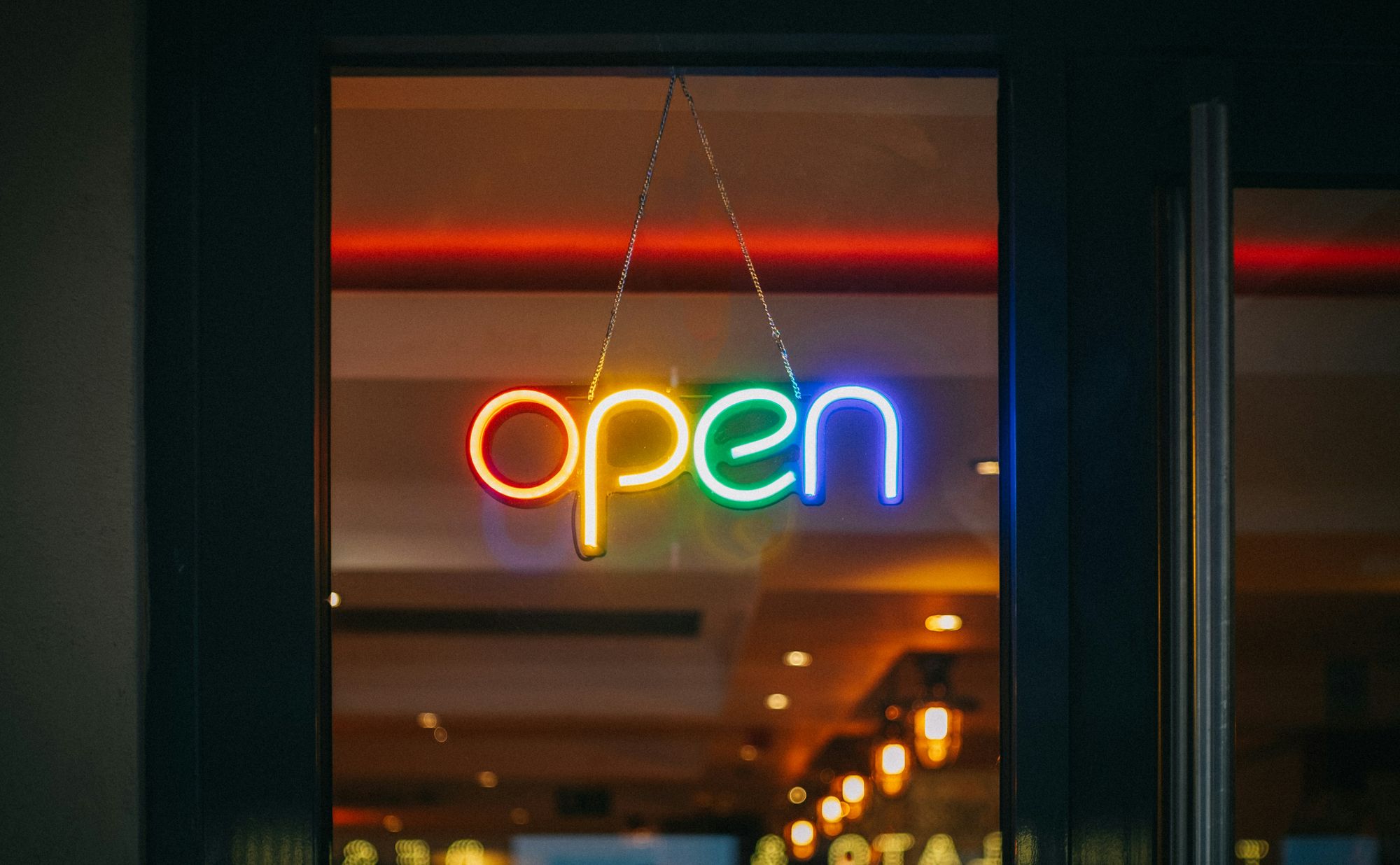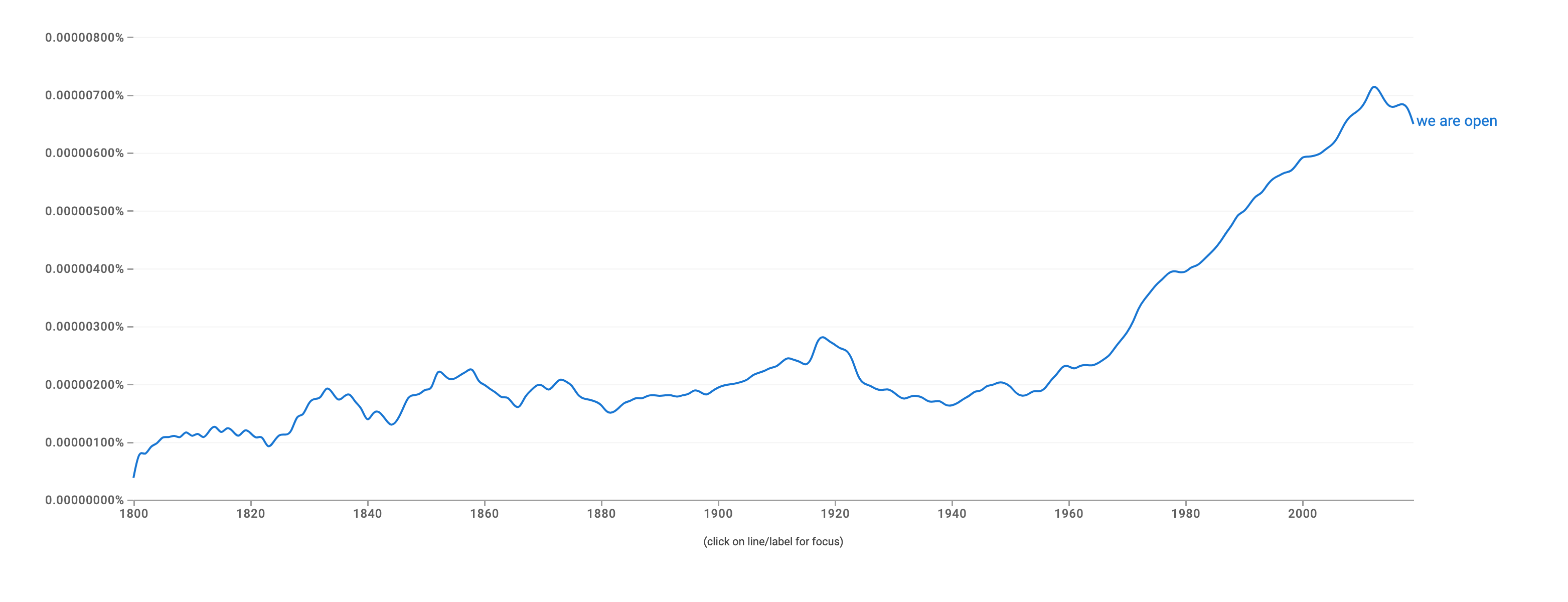- "We are opened" is the incorrect variation of "we are open."
- "We have open" is the incorrect variation of "we are open."
- "We are open" is the correct way to express that your business is currently operating. "Open" functions as an adjective here, describing the present state of being accessible to customers.
🏪 As your trusted neighborhood pharmacy, we are open to serve you with a friendly smile and expert advice on all your health and wellness needs.

What is the difference between "we are opened" vs. "we have open" vs. "we are open"?
"We are opened":
- This phrase is less common and might suggest a state of being opened by an external force or agent. For example, "The door was opened by the janitor." It is not typically used to express the general state of availability or business.
"We have open":
- This phrase is grammatically incorrect. It lacks a direct object after "open." A correct form might be "We have an open position" or "We have open opportunities," where "open" is an adjective describing the nature of the position or opportunities.
"We are open":
- This phrase is commonly used to indicate that a business, establishment, or service is currently available or operational. For instance, "The store is open until 9 PM." It signifies a state of readiness or accessibility.
When to use "we are open"
"We are open" is used to communicate the present operational status of a business, establishment, or venue. It signifies that the doors are currently unlocked, services are available, and the entity is ready to welcome customers, visitors, or clients.
This phrase is commonly displayed on signs, websites, or other communication platforms to inform people that the business or facility is currently in operation and ready to serve. Here are some situations in which "We are open" is appropriately used:
- Store or Business Hours: A retail store might have a sign on its door or a banner on its website stating, "We are open from 9 AM to 7 PM."
- Restaurant Operations: A restaurant may use this phrase to indicate that it is currently accepting customers and providing dining services. For example, "We are open for breakfast, lunch, and dinner."
- Service Providers: Various service-oriented businesses, such as salons, gyms, or healthcare facilities, use this expression to inform clients of their operational status. "We are open for appointments" is a common usage.
- Event Venues: Places like theaters, museums, or galleries may use "We are open" to inform the public about their accessibility for events or exhibits.
- Online Platforms: E-commerce websites or online services can display "We are open 24/7" to emphasize their continuous availability for users.
The use of "we are open" over time
Examining the graph below, we can see that the use of the phrase "we are open" has increased since the 1960s. Its use peaked after the 2000s, but has since decreased.

Example sentences
- Visit us today! We are open from 10 AM to 6 PM, ready to assist you with all your shopping needs.
- Hungry? Come on in! We are open for dine-in and takeout services every day of the week.
- Explore our online store anytime – we are open 24 hours a day, 7 days a week for all your shopping desires.
- Exciting exhibits await you! We are open to the public, welcoming art enthusiasts to our gallery from 11 AM to 8 PM.
- Happy Saturday! Swing by our coffee shop; we are open until 5 PM today, serving your favorite brews and treats.
- Discover history with us! We are open to visitors every day, offering a journey through time and culture.
- Escape into a good book! Check out our library; we are open Monday to Friday, offering a quiet space for reading and learning.
Examples from the web
"'We are open for business,' she said." - The New York Times
"But we are open to everyone, actually." - The New York Times - Food
Synonyms and related phrases
- Open for Business
- Operating
- Available
- Ready for Customers
- Accessible
- In Service
- Welcoming Visitors
- Accepting Clients
- Unlocked
- Ready to Assist
FAQs
Do we say the shop is open or opened?
The correct phrase is "The shop is open." In English, when referring to the operational status of a shop or business, the word "open" is used. The correct form in this context is "open" rather than "opened." So, you would say, "The shop is open," to convey that the business is currently operational and ready to serve customers.
How do you ask if the office is open?
To inquire about the office's operational status, you can ask, "Is the office currently open for business? I need to check if I can visit or if there are specific operating hours today. Thank you."
Is it correct to say we are closed?
Yes, "We are closed" is correct when indicating that a business, establishment, or venue is not currently in operation. This phrase communicates that doors are shut, services are unavailable, and the entity is not accepting customers or visitors at that moment.
Summary
For clear and professional communication, stick to "We are open" to indicate that your business is currently operating and ready for customers.

Want to sound like a native speaker?
Engram’s AI-powered grammar checker makes your English sound like a native speaker’s, suggesting natural English expressions on top of fixing grammar, spelling, punctuation, word order, and vocabulary.

References:














